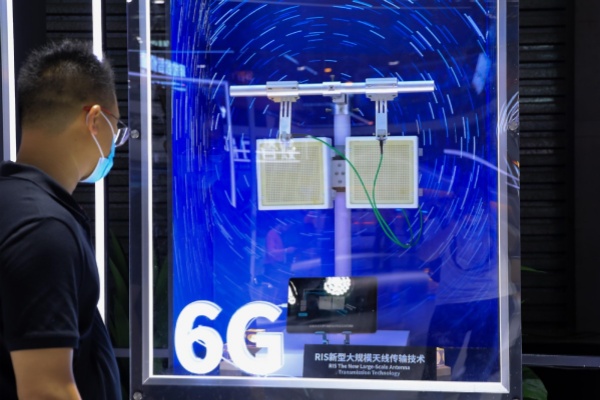
- Home
- Media Center
-
Events
- Wuzhen Summit
- Regional Forums
- Practice Cases of Jointly Building a Community with a Shared Future in Cyberspace
- World Internet Conference Awards for Pioneering Science and Technology
- The Light of Internet Expo
- Straight to Wuzhen Competition
- Global Youth Leadership Program
- WIC Distinguished Contribution Award
- Membership
- Research & Cooperation
- Digital Academy
-
Reports
- Collection of cases on Jointly Building a Community with a Shared Future in Cyberspace
- Collection of Shortlisted Achievements of World Internet Conference Awards for Pioneering Science and Technology
- Reports on Artificial Intelligence
- Reports on Cross — Border Ecommerce
- Reports on Data
- Outcomes of Think Tank Cooperation Program
- Series on Sovereignty in Cyberspace Theory and Practice
- Other Achievements
- About WIC
- 中文 | EN

Nation aims for beachhead in 6G development battle

An attendee visits a booth featuring 6G RIS new large-scale antenna transmission technology at the Mobile World Congress in Shanghai, in June last year. [Photo/China Daily]
Progress underway
In July, a group of Chinese telecom engineers announced they had established the world's first field test network that integrates communications and intelligence.
The experimental network has achieved remarkable improvements in key communication metrics, including capacity, coverage and efficiency, according to Zhang Ping, a Chinese Academy of Engineering academician and a professor at the Beijing University of Posts and Telecommunications.
The network serves as a platform for research institutions conducting theoretical research and initial verification of 6G pivotal technologies, and effectively lowers the entry threshold for 6G research, making it more accessible for innovation, according to the team of engineers.
"The European Union, the United States, Japan, South Korea and other countries and regions have all initiated research on 6G, and China has unique strengths," said Wen Ku, director-general of the China Communications Standards Association.
China has made remarkable strides in 5G infrastructure, which gives it an unparalleled edge in exploring 6G technologies, he said.
By the end of May, China had built over 3.8 million 5G base stations, accounting for 60 percent of the global total. These advances have helped position China as a global leader in 5G technology, with over 60 percent of mobile communication users in the country now utilizing 5G services, according to the Ministry of Industry and Information Technology.
Meanwhile, China has handled over 94,000 5G applications in industries such as manufacturing, mining, power, ports and healthcare, the ministry added.
"Advancing the use of 5G is like building a good bridge and road for 6G, and efforts to promote the large-scale application of 5G will lay a solid foundation for 6G development, which is still in the early stage," Wen said.
More importantly, the country already has an early edge in 6G patent applications over the US and Japan.
China's 6G patent applications accounted for 40.3 percent of the global total, and topped the list of global 6G patent filings, according to a survey conducted by Japanese media company Nikkei and Tokyo-based research company Cyber Creative Institute in 2021.
The US and Japan took second and third spots on the list with 35.2 and 9.9 percent respectively, followed by Europe with 8.9 percent, and South Korea with 4.2 percent, the report said.
In the telecom industry, countries with core advantages in previous-generation wireless technology are more likely to gain advantages in next-generation technology and achieve technological leadership and promote healthy industry development, China Galaxy Securities said in a research note.
Yang Guang, senior chief analyst at the global market research company Omdia, said: "China believes that a mobile network is an important infrastructure that needs to be built ahead of schedule. Once the road is ready, cars will come naturally. The underlying condition is that Chinese operators are all State-owned enterprises and need to bear considerable social responsibility."
European and US telecom operators are private enterprises, and their first consideration is financial performance. Their main objective is to reduce costs, which makes them less inclined to build infrastructure, Yang said.

The World Internet Conference (WIC) was established as an international organization on July 12, 2022, headquartered in Beijing, China. It was jointly initiated by Global System for Mobile Communication Association (GSMA), National Computer Network Emergency Response Technical Team/Coordination Center of China (CNCERT), China Internet Network Information Center (CNNIC), Alibaba Group, Tencent, and Zhijiang Lab.





